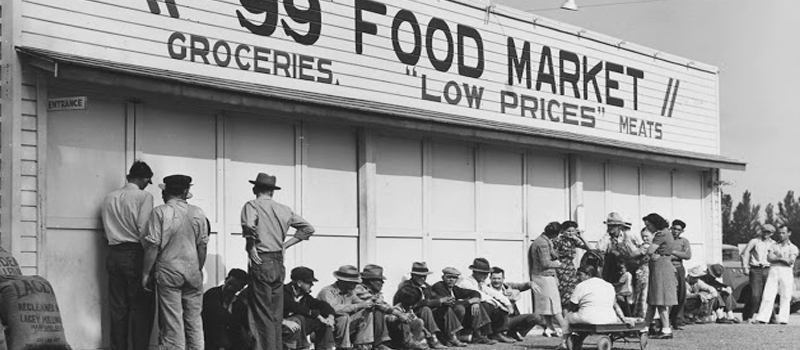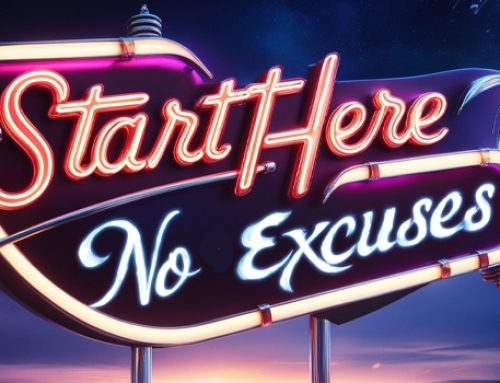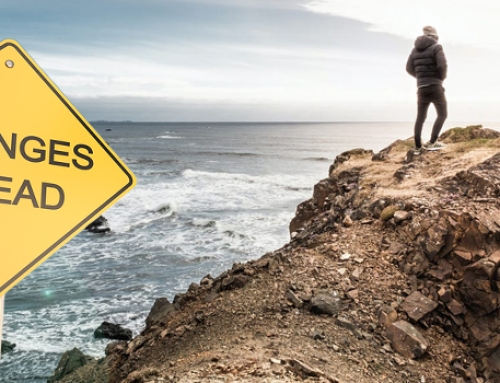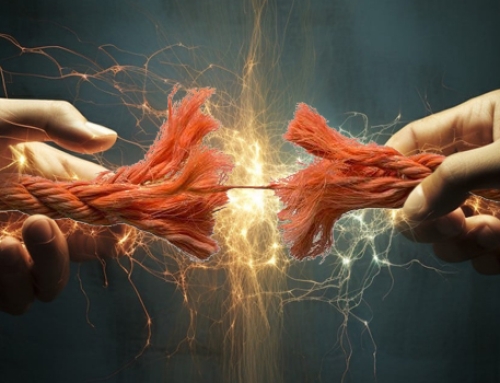Your Current Self-Sustaining Status
Who of you could, if there is no money, no grocery stores, no food banks, or electrical power at all could continue to live a life similar to what they had previous to the “Snap”? Now certainly we aren’t looking at a society after someone named Thanos clicked his fingers together, however, do we have the intestinal fortitude to maintain our and our loved ones’ lifestyle if or some say, when the bottom falls out of the economy?
Have we asked ourselves the hard questions what we would have in that circumstance? Are we going to be cautiously optimistic or quaking in our proverbial boots? Be realistic with your prospects because if it does truly happen, reality tends to slap silly those who are naïve or ignorant of what’s coming down the pike.
It isn’t something you can fake or just bumble around until you figure it out. There are some methods and skills that take a lot of practice. The subject of preparedness for self-sustenance is so massive that I can barely scratch the surface in a single article, but it’s a start. So let’s get started!
In a nutshell…
Self-Sustaining preparedness refers to the stockpiling of goods, supplies, knowledge, reference literature, and other essentials in order to better weather natural disasters, terrorist attacks, economic uncertainty, and other difficulties. It also involves developing and practicing the skills that can best suit for times that have less automation, or electricity, or convenience for goods and services. The Self Reliant or preppers (as we’re called) know our efforts will not insulate us from hard times, but will help cushion the blows of regional or national emergencies which are out of our control.
Now the purpose of “prepping” is to get things done BEFORE the crap hits the fan in advance of the hard times. If its after the course of events that bring it all down, you aren’t prepping, you are playing catch up and that never works out the way you want it to. For example when a hurricane is forecasted there is a vast difference from those who have boarded up previous to its landfall to those who are trying to keep out the storm while it rages. Don’t get caught in the chaos that ensues at grocery stores, hardware store locations, gas stations and convenience stores as people frantically try to cover their hides when crunch time is upon them.
I think you and I can agree: it’s far better to be prepared and self-sustaining than not. But preparedness comes in a lot of different shapes and sizes, flavors and intensities, all depending on the personal level of concern by the individuals involved.
Circumstance and Situation
How you prepare to sustain yourself depends on an endless number of factors. Your location (urban, suburban vs. rural), type of home (house, apartment, mobile home, yurt, etc.), numbers and ages of family members, health factors, income levels – all these issues will affect what kind, and to what extent you can prepare.
Whether to bug out or bug in (hunker down) depends on the nature of the emergency as well as your physical location. There is no easy answer to this situation. Bugging in (staying in the city) will only work until your supplies are gone or your safety is compromised. At that point, bugging out may be your only option if you have someplace to bug out to.
Hunkering down (bugging in) is a legitimate option for many people under a number of emergency circumstances. But that doesn’t mean you just lock your doors. Hunkering down means you create your bug-out retreat right there at home. That means having your Seven Core Areas stocked and ready. Getting out of dodge just means you need to do all that but make it all ambulatory (ready to carry).
There are advantages and disadvantages to each situation you may find yourself in. Many feel it’s easier to be self reliant in a rural location, and to some degree this is true. Livestock, gardens, space for stored supplies, smaller population numbers and a lesser likelihood of roving gangs of looters are all benefits of living in the country. By no means, however, living in the country is a guarantee of escaping any problems. Sometimes it could be more dangerous because it is so far away from any resources. So you really have to determine for yourself what and how you develop your skills to survive, and even thrive.
This article will focus not so much on the minutiae of what to prep, but rather on some general areas of things to consider. These considerations must then be tailored toward your particular circumstances. But keep in mind two things
You’re not Bear Grylls
Most of us aren’t the Bear Grylls type. Most of us wouldn’t know what is truly edible, plant or otherwise, if it bit us on the tush. So, whatever you do, don’t think “living off the land” is the first choice if the bleep hits the fan just because you know what a raspberry bush looks like.
Are you in an urban area? What do you think is the plan when the shizz hits the fan, what would you do? Don’t think you can simply forage for all your dietary needs from wild plants in vacant lots. Don’t stupidly assume you could even identify edible plants, let alone gather them in the numbers you would need to collect in order to keep yourself and your family alive. Let alone how to prepare it all to cook. And just think there may be more than just you who thought of doing the gathering which would strip bare those vacant lots of everything except broken glass and tin cans.
And if you think you are going to become an expert hunter right off the bat, think again. It will be a tough go of it, especially if you live in the city, unless you like cat, bat and rat meat. Where will you hunt? How will you get the ammo let alone the gun? Think a revolver could be accurate enough for distance tagging? Remember, if people are hunting for survival, you’re competition for a limited resource is that much more heightened. And let’s say you do hit the mark, how will you get your meat back home? How will you preserve it?
You’re not Charles Bronson either
The Death Wish movies of the 70s glamorized the taking care of business, of a man and his gun fending off gangs and ruffians. Real life, is not that way. A popular whimsy among some survivalists is the John Rambo fantasy. Things are never so black and white. And in a world that would need compassion, it would be hard for most of us to keep the emotion out of each decision to help or turn away. I wholeheartedly affirm a part of being prepared is being suitably armed, you must be judicious in how you use the power however. Be sensible in in your defenses. Don’t go looking for trouble. Be prepared to handle the kerfuffle if it arises in your direction.
Rule of Three
There is what they call the Rule of Three. What this means is they have one main and two backup methods of doing whatever needs to be done (in other words, a backup to their backup). Cooking, heating, lighting, and communications are all aspects that need backups of backups in case the primary method(s) are incapacitated. So in your preparations of storage and skill, think in terms of multiple backups in case your primary source fails.
Practice Makes Permanent
No matter what your circumstance or situation, you can continue to practice the ways of being self sustaining. Whether it is gathering a commodity or working on a skill you want to master, when you do it often enough you are going to be able to do it when it counts the most. Practice includes, the management of your supplies; the identification and real life hands-on working of skills that you normally wouldn’t do daily; keeping the equipment you now have in working order and your ability to use them.
If the power goes out, the last thing you want to do is grope around in the dark trying to find your flashlight, only to find the batteries are dead because the kids were playing red light green light. Know where your equipment is and make sure it’s in working order. Do this often and you won’t have any surprises that are too much to overcome.
Operational security or keeping mum about it all
This is sound advice, we ourselves try to follow this even with our rather public involvement in teaching self-sufficiency and preparation, but I suggest you practice what the military calls Operational Security (OpSec). In a very real sense, shut your trap. Keep as quiet as possible and low-key as warm milk. Don’t talk about it. Don’t boast. Don’t announce to the world or even show more than a handful (if that) what kinds of firearms you possess and how much food you have stored.
The reason is, there will always be somebody happy to liberate you of your supplies. You never know who will act the bully when they become desperate.
The Seven Core Areas for Self-Sustainability
With all that said we are ready to itemize the 7 main areas that you need to be concentrating on and getting prepped. I’ve listed below what I call the Seven Core Areas of Self-Sustainability. I need to stress that this list is by no means comprehensive. However, if you’re prepared in these seven areas, then you can focus on achieving other, more tailored preparations to suit your particular circumstances. Let’s get started!
Water
Without water to drink and wash, you’ll be miserable (or dead). Can’t survive more than 3 days without water intake. At all times you should have a minimum of 20 gallons stored in your home. Look for options to secure larger quantities of water (roof runoff? storage tank?) as well as ways to sterilize surface water such as bleach, iodine, or filtration. Do you know what goes into building your own water filtration system? Could you build one?
If you’re preparing for a minimum of three months, then your storage space for water will be huge and will probably take up far more space than most people have available. That’s why you need the means to purify water. Practice and experiment how home-built filtration systems work be doing it now.
Food
Without stating the obvious. this doesn’t mean keeping your deep freezer fully stocked. It helps, but what do you eat after a week’s worth of no electricity? Purchase staples you enjoy eating (rice, beans, oatmeal, etc.) and learn to store, prepare and COOK them. These have the added advantage of being dirt cheap. If you want to take the next steps, learn to can, bottle-preserve, dehydrate and freeze dry. Properly home-preserved food lasts years without refrigeration, and canning in particular is a valuable skill as well. Alternately, buy lots of commercially canned food.
Along with storing food, you should have the means to prepare it. Your options will be more limited if you’re in an urban high-rise apartment (where you can’t install a wood cookstove, for example), in which case your food will have to be pre-cooked (such as MREs) or otherwise edible without cooking. Consider getting a propane camping stove or portable Dutch-oven kettles and cast iron cooking utensils. And practice using them when cooking over a campfire. Even having a few Bunsen burners on hand can make a difference in the short term. You don’t have to settle for unheated soup or beans right out of a can all the time.
Heat
Heat is essential to every warm body, man or beast. And in any situation you may find yourself, heat is a major concern for us. How can you heat your house or apartment if the power goes out? Everyone’s circumstances are different – you probably can’t install a woodstove in a Chicago apartment – so think through what will work for you.
Be mindful about ventilation when considering your heat sources, especially for fires and propane space heaters. Endless people have been asphyxiated due to carbon monoxide poisoning because they chose the wrong option to heat their living space. Some buildings have windows which will not open, and this must be considered when thinking through your heat sources.
Lights
Back when candles and kerosene were commonplace, people didn’t do too much after dark. You certainly don’t want to be in the dark without any way to light your way, do you? Everyone can afford an oil lamp or two. Don’t bother with those pricey containers of scented lamp oil, either. A gallon of kerosene is less than $10 and works just fine.
While flashlights and batteries are necessary and nice to have, you’ll go through your battery supplies very quickly if you depend solely on them for lighting after dark. Remember your Rule of Three: plan to have backups to your backups. You should have candles, oil lamps, perhaps battery-powered LED lamps, or other light sources.
Sanitation
Will always be a problem and a concern for those who don’t like to have dysentery every three months. And before society goes back to dumping the honeypots out their windows on to the streets again, we need to take the necessary steps to keep the diseases that situation would cause. What happens if you can’t flush your toilets? IF you aren’t in a place that would accommodate an outhouse or two. Not to mention if you run out of diapers or feminine hygiene products? If you don’t have toilet paper what is one to do? Think about what kind of reusable alternatives you can substitute for pricey disposable items.
Now this comes down to your water supply and the pressure of the water you can muster, but finagling a spray bidet of sorts can be a suitable option when all else fails. Otherwise you will have to find reusable versions of disposable sanitary items. Cheap washcloths from the dollar store can act as reusable toilet paper. You could even learn to make your own TP out of common materials. Use cloth instead of disposable diapers. Try washable feminine napkins instead of disposable. Of course, again, these reusable versions require a means to wash them, so think through your options of your water storage capacities. For short-term preparedness, it might be better to stock up on disposables.
If you cannot flush your toilets and an outhouse isn’t possible, a five-gallon bucket lined with heavy-duty trash bags and a toilet seat may be your next best option. Wood shavings, sawdust, or ash can be sprinkled in the bucket after each use to help control odors. Consider as well a means to set up a place for composting that can take care of the stinky stuff and perhaps every growing season do some benefit after the stink.
Medical
Now may be the time to take a refresher course for basic first aid. Remember, practice makes skills permanent. If the site of blood or needles or dismembered limbs make you queasy, now is the time to gird yourself to the task so to speak. Determine you will be a help more than a hinder when it comes to emergency situations, especially when more competent medical professionals aren’t going to be available. You might also stock up on medical items you may not otherwise consider; burn dressings, tape closures, compression bandages, and lots of over-the-counter pain killers.
Can you doctor yourself for minor injuries? Do you have a good stock of your prescription medicines? It doesn’t cost much to pull together a comprehensive first-aid kit. It might be harder to stockpile prescription medications, so this is something worth discussing with your doctor.
Do you know how to get medicines that aren’t readily available from your pharmacist? Do you know some home remedies that you can put together with herbs and dried concoctions? Do you know how to treat shock, or set a bone, or take care of a burn? Now is the time to learn.
Safety
What happens when too many people suddenly want to be your best friend post-event? This is the time to decide beforehand what your responses will be to certain situations that can happen in chaotic moments. What should you do if you live in an urban area subject to rioting and unrest? What should you do if you live in a rural area and people are knocking on your door or shuffling through your barn? Some people interpret “safety” to mean they should have an arsenal of guns. Others think they need a secret rural bug-out location. However you interpret it, identify prospective dangers for your circumstances and think of how to answer and mitigate them.
Personally, every family member who are old enough to handle a firearm should be taught gun safety factors and frequent target practice even if it is just a 22. Adults should also have holsters (either concealed or otherwise) for ease of carry during situations that can arise. Yeah, right now it isn’t the wild west but could easily resemble it once again when societal mores and official policing becomes lax or non-existent.
Safety should be more than just firearms. It also includes such things as situational and strategic awareness, home and property security, communications, and local relations (friends, neighbors, community).
A single article here can barely scratch the surface of the preparedness/self-sufficiency mindset. But as our nation faces an unprecedented number of major threats to our economy, our security, and our way of life, I believe everyone should have the basics of “Prepping” down straight.
Overall TakeAway
I have concerns about two possible scenarios that would mean that an interruption of our way of life on a national (or extended regional) scale is feasible.
- #1) That our country will experience an economic collapse, in which case our best “savings account” is what is euphemistically called “tangibles.” (In Prepper lingo this is known as beans, bullets, and band-aids.) A collapse of our banking system and its fiat currency could result in massive unemployment and other financial hardships deeper and darker than the first Great Depression.
- #2) The loss of our national power grid either through natural events such as massive solar flares or through terrorism (electromagnetic pulse weapon detonated in the upper atmosphere which will incapacitate the power grid). Our country is no longer capable of functioning without electricity. The result of which would also result in a Grand Depression, never before seen.
For short-term preparedness, in particular, I recommend having at least three months of supplies in the Seven Core Areas (listed above). Why three months? Under even the most dire regional conditions, things will usually shake out by the end of three months. Outside help will become available, or conditions will otherwise change.
Keep in mind that if things are in chaos for a week or more, your unprepared neighbors may ask you for help. And you should help, if for no other reason than long memories after the crisis is past. It’s important not to forget charity and mercy during an emergency.
Under these conditions, having adequate supplies in the Seven Core Areas will help people survive in moderate comfort. By “adequate” I don’t mean you’re living in the lap of luxury; I mean you’re not starving, freezing, or sitting in the dark every night.
Start thinking now. Please, don’t be caught unawares without any ability to take care of yourself. Work to not be a detriment but a real asset when things go sideways for everyone in the community. By so doing you can rest assured you can handle anything come what may and be able to say, “Wow, what a stress-free way to live.”






